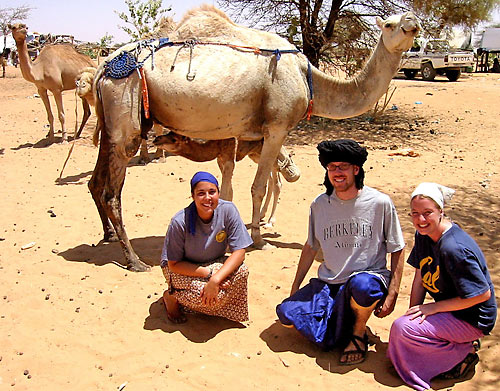Learning to Search
=== Learning to Search ===
A few years ago a boss called me at home asking if I could locate and e-mail an INS document she was having trouble finding. Before the phone conversation was over, I had already sent it to her, and a few days later I finally divulged my secret: Google. So when a United Nations volunteer asked me to lead a session teaching high school students how to use Google to learn more about HIV/AIDS, I was excited. My French and Hassaniya still stay upright only with training wheels, but I certainly know how to use a search engine.
The class was part of a week long United Nations campaign to raise awareness about HIV/AIDS and volunteer-ship. It was originally scheduled to start on a Monday, and Malick, the computer trainer sent from Nouakchott, was ready to teach when SONALEC cut the power “on accident” at the cyber café. Malick had to leave the next day, so that’s when I stepped in. Luckily, I had a translator – Abdul Baghry, science teacher at the Kiffa Lyceé and Red Cross volunteer – and fellow PCV Andrew oferred to help as well.
I expected my first teaching engagement in Mauritania to be a disaster, so you can imagine my delight in experiencing only a minor flop. The 10 computers in the main room could barely stay connected to the internet at the same time. Everyone was logged off halfway through the two hour class for no good reason, resulting in a 30 minute interruption. Students had very little knowledge of French, and in most cases knew just enough about computers to be dangerous. One student got frustrated with the performance of his computer and double-clicked Internet Explorer 12 times, resulting in 12 cascading windows that paralyzed his anemic machine. Another seemed annoyed when I told her that you actually need to spell key words more or less correctly if you want good search results. Sorry, but ‘Moritaynia’ isn’t going to get you very far. Other students decided they were more interested in checking out Arabic news sites. Even my translator wanted to check his e-mail by the end of the training. Hey, it’s free internet time, after all.
The bill of 10,000 Ougiya (about 40 USD) was picked up by the UN – your tax dollars at work. I think it was worth it. The nuances of Boolean operators will have to wait for another day, but at least ten Mauritanian high schoolers know that there’s an ocean of information on HIV/AIDS and everything else, if they can only afford a dollar an hour for the boat.
=== Mauritanian Financial Relief ===
In a past edition of AIM I bemoaned the state of Mauritania’s legal tender. The largest unit is 1000 Ougiyas (UM), between three or four American dollars. Nearly all the bills – 100, 200, 500, 1000 – are revolting to the eyes and nose. Notes are torn, taped, and stapled together, as well as being encrusted in filthy grime. Every bill must be checked to ensure that the serial number on the left matches the number on the right. A sleepy-looking shopkeeper who hasn’t dusted his shelves or picked up the trash in 17 years will spot mismatched serial numbers on a 500 UM note before you can walk out with your packet of cookies.
Don’t feel bad for me; relief is on the way. No, the government hasn’t wizened up enough to migrate to the West African CFA (heaven forbid Mauritania ever considers itself part of West Africa). But they’ve created a 2000 UM note and issued sparkling new versions of the existing increments. The 1000s are especially glorious. Yes, the deep almost purple-tinted turquoise looks a bit like Monopoly money, but no one plays that game here (except for the government, heh heh) and the bills are a crucial half inch or so shorter that allows them to actually fit into western wallets. 5000 and 10,000 UM notes are still needed, but at least with the 2000 you’ll only need 750 bills to buy that used Mercedes 190 diesel sedan.


<< Home